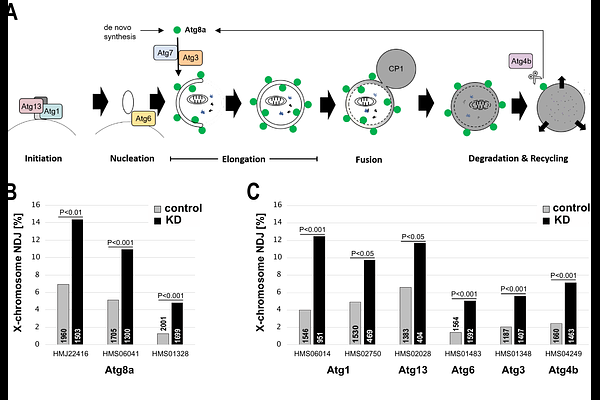Basal autophagy during meiotic prophase I is required for accurate chromosome segregation in Drosophila oocytes and declines during oocyte aging

Basal autophagy during meiotic prophase I is required for accurate chromosome segregation in Drosophila oocytes and declines during oocyte aging
Hilpert, D. C.; Haseeb, M. A.; Bickel, S. E.
AbstractMeiotic segregation errors in human oocytes are the leading cause of miscarriages and trisomic pregnancies and their frequency increases exponentially for women in their thirties. One factor that contributes to increased segregation errors in aging oocytes is premature loss of sister chromatid cohesion. However, the mechanisms underlying age-dependent deterioration of cohesion are not well-defined. Autophagy, a cellular degradation process critical for cellular homeostasis, is known to decline with age in various organisms and cell types. Here we quantify basal autophagy in Drosophila oocytes and use GAL4/UAS inducible knockdown to ask whether disruption of autophagy in prophase oocytes impacts the fidelity of chromosome segregation. We find that individual knockdown of autophagy proteins in Drosophila oocytes during meiotic prophase causes a significant increase in segregation errors. In addition, Atg8a knockdown in prophase oocytes leads to premature loss of arm cohesion and missegregation of recombinant homologs during meiosis I. Using an oocyte aging paradigm that we have previously described, we show that basal autophagy decreases significantly when Drosophila oocytes undergo aging. Our data support the model that a decline in autophagy during oocyte aging contributes to premature loss of meiotic cohesion and segregation errors.